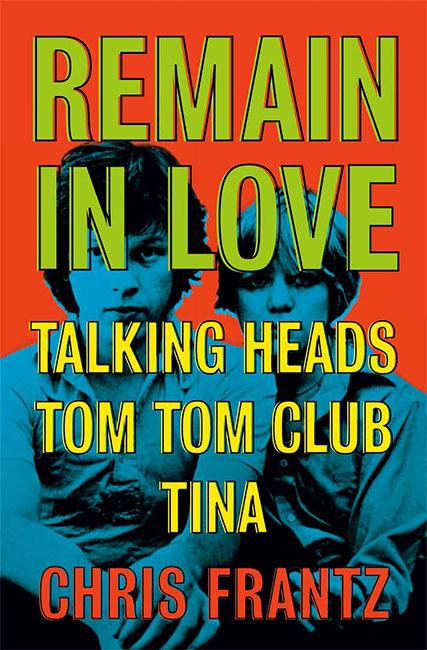
Remain In Love. Talking Heads, Tom Tom Cub, Tina, Chris Frantz
(Orion, £20, hbck)
Chris Frantz is not a natural nor an interesting writer. His story is told in bite-sized chapters in mundane, repetitive and awkward prose that is both well-mannered and slightly tedious, despite the fact he is writing about punk and post-punk New York, rock’n’roll hedonism, along with fame and fortune.
Frantz does not let this go to his head though. It is clear from the early chapters that, like Tina Weymouth, his musical and familial partner, Franz is from a wealthy family in the American South, and he is much straighter than the art-rock of Talking Heads or the white reggae/funk/rap hybrid of Tom Tom Club might suggest. He is polite when it comes to other people, circumspect when it comes to sexual or pharmaceutical indulgence or abuse, sickeningly romantic whenever Tina Weymouth is mentioned, and surprisingly sexist throughout. There’s rarely a scene in this volume where at least one woman isn’t described as ‘hot’ or ‘foxy’.
Did I say Frantz was polite about other people? Well, there’s two exceptions: David Byrne and Brian Eno. Both are presented here as money-grabbing, overbearing, egotistical and devious manipulators, who refuse to recognise the rhythm section of Franz and Weymouth as the musical powerhouse that Frantz thinks they are. He may well, of course, be right, and even when Talking Heads were making their classic albums Fear of Music and Remain in Light the music papers at the time were full of musical and personal differences. (I still have some of the pages from NME and Sounds tucked into my LPs.)
So what have we got? An episodic autobiography, with some early childhood adventures, student life at RISD in Providence, a move to downtown Manhattan, early demos and gigs at CBGBS, a record deal, lots of gigs, lots of albums being recorded and sold, casual drug and alcohol abuse, the formation of the Tom Tom Club, dealings with the devious David (who breaks up Talking Heads without telling anyone else) and brainy Brian, semi-retirement to and production duties in Nassau, and lots of walk-on appearances by the rich and famous. Andy Warhol, Grace Jones, Robert Palmer, Debby Harry Patti Smith, John Martyn, and hundreds of others are here, not to mention the Ramones.
Frantz loves the Ramones, Frantz adores the Ramones, Frantz worships the Ramones, nearly as much as his wife Tina. Their cartoon punk is revered throughout this book, and there is almost as much about the band as there is about Talking Heads. They can do no wrong, although there are stories of internal bullying throughout. As someone who never ‘got’ the Ramones’ image or music it’s simply bewildering to have them praised in such a way. More amusing is a late chapter about the ridiculous attempt by the Happy Mondays to record an album as they systematically wreck cars, and smoke, ingest or inject and and every drug they can find in the Bahamas.
I wasn’t expecting, nor did I want, kiss & tell stories or rock’n’roll self-mythologizing, but some kind of emotional, musical and personal engagement would have helped make this book more interesting. Frantz is so distanced and reserved from his story that it feels like stuff simply happened to him, there is never any sense of surprise, sweat or despair; it is all drift and occurrence, all told by a simpering drummer in love with the band’s bass player.
Talking Heads were an amazing band, and revisiting some of their back catalogue reminded me how original and out-of-step with their musical colleagues and mainstream music they were. They, along with Television, Blondie and Patti Smith, were a musical force to be reckoned with, helping move the critical spotlight to New York, where disco, minimalism, rap and punk were all fermenting and cross-pollinating. It’s clear from this book that Frantz may have been there but he has either forgotten the interesting bits, or simply watched it happen whilst he kept to the beat.
Rupert Loydell
